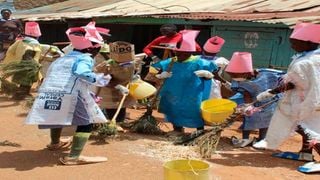
Grade Three pupils at Bridge International Academy during their environmental practicals in Kisii town in September 2019.
| File | Nation Media GroupNews
Premium
Relief as Grade Seven home activities reduced
What you need to know:
- Parents lamented that they had to carry out the activities on behalf of the learners due to limited time.
- Education experts had joined parents in pointing out that many learners were being disadvantaged with regard to digital activities.
The Kenya Institute of Curriculum Development (KICD) has bowed to pressure from parents and reduced the number of home and community activities Grade Seven learners are expected to carry out.
In the revised curriculum designs for Grade Seven, which forms the first year of junior secondary, the KICD has limited community service learning (CSL) to one integrated activity that will cover various subjects.
The CSL concept will be covered as a topic in Life Skills Education to guide the learners on how to conduct the integrated activity.
The activity will mostly be school-based, with community interaction limited to data collection and related actions.
“All learners in Grade Seven will be expected to participate in a CSL class activity... Teachers will guide the learners to execute a simple school-based integrated CSL class activity. The activity can be done in one to two weeks outside the classroom time,” the designs read in part.
While briefing publishers on the draft designs that were released late last year, the curriculum development agency explained that they would not expect Grade Seven books to have as many CSL activities as were in previous grades, where every sub-strand (equivalent to sub-topic) had a CSL activity prescribed. Publishers were allowed to infuse the activities where they deem fit but keep them at a minimum.
The changes will be a major relief for parents, who had complained on social media and other forums that the new curriculum was burdensome to them.
Parents lamented that they had to carry out the activities on behalf of the learners due to limited time and that the materials required were many and expensive.
School-based activities
There were also complaints that illiterate parents were unable to help their children with the activities.
During the publishers’ briefing last year, the KICD also asked textbook developers to provide alternatives to digital activities to avoid leaving out learners who may not have access to the necessary resources.
For example, where learners are asked to search for information online, books and magazines should be given as an option.
Education experts had joined parents in pointing out that many learners were being disadvantaged with regard to digital activities.
Kenya Publishers Association chairman Lawrence Njagi confirmed in a telephone interview that indeed the CSL activities had been scaled down significantly.
“This, we believe, could be as a result of the pressure from parents,” Mr Njagi said.
Mr Njagi added that even the CSL activities that publishers would be infusing in the books would be more school-based rather than home-based.
Speaking to the Nation, KICD Chief Executive Officer Charles Ong’ondo said in the earlier concept, which is currently being implemented in Grades One to Five, learners are required to undertake CSL activities in every subject. The concept will also be implemented in Grade 6.
The integrated approach, he said, allows teachers to assign learners different CSL projects.
Interpersonal skills
“However, for Grade Seven, which is junior secondary, the CSL projects will be undertaken under the Life Skills Education subject, but teachers will still be able to give fewer and less engaging CSL assignments in the other subjects,” said Prof Ong’ondo.
The KICD boss said putting the big CSL projects under one subject would enable learners to do their assignments successfully and effectively.
According to the Basic Education Curriculum Framework, learners in junior secondary, which commences in January next year, will study 12 core subjects and seven optional subjects.
Life Skills is among the key subjects that learners at the junior secondary level will be required to study. The subject is aimed at enhancing knowledge and appreciation of oneself as well as sharpening interpersonal skills.
Learners are expected to acquire psychosocial competencies and interpersonal skills, which in turn should enable them to make informed decisions, solve problems, think creatively and critically and be able to communicate effectively.
The subject is also designed to enable the learners to interact with their teachers, peers and the environment.
“This subject moves beyond providing information to the development of the whole individual. Teachers will assign major engaging and interaction projects in this subject,” said Prof Ong’ondo.





